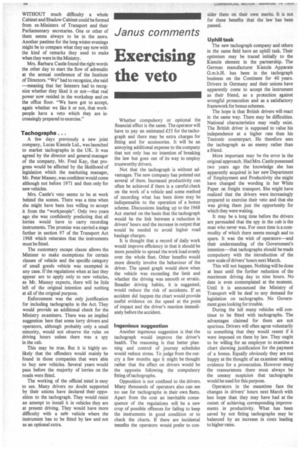Janus comments
Page 60

If you've noticed an error in this article please click here to report it so we can fix it.
Exercising the veto
Whether compulsory or optional the financial effect is the same. The operator will have to pay an estimated £55 for the tachograph and there may be extra charges for fitting and for accessories. It will be an annoying additional expense to the company that not only has no intention of breaking the law but goes out of its way to employ trustworthy drivers.
Not that the tachograph is without advantages. The new company has pointed out several of them. Increased productivity can often be achieved if there is a careful check on the work of a vehicle and some method of recording what has been done may be indispensable to the operation of a bonus scheme, Discussions leading up to the 1968 Act started on the basis that the tachograph would be the link between a reduction in drivers' hours and the increase in output that would be needed to avoid higher road haulage charges.
It is thought that a record of daily work would improve efficiency in that it should be more possible to spread the work load evenly over the whole fleet. Other benefits would more directly involve the behaviour of the driver. The speed graph would show when the vehicle was exceeding the limit and whether the driving was smooth or erratic. Steadier driving habits, it is suggested, would reduce the risk of accidents. If an accident did happen the chart would provide useful evidence on the speed at the point of impact and the driver's reaction immediately before the accident.
Ingenious suggestion Another ingenious suggestion is that the tachograph would improve the driver's health. The reasoning is that better planning and control of journey schedules would reduce stress. To judge from the outcry a few months ago it might be thought rather that the effect on drivers would be the opposite following the compulsory fitting of tachographs.
Opposition is not confined to the drivers. Many thousands of operators also can see no use for tachographs in their own fleets. Apart from the cost an inevitable consequence of the regulations will be a new crop of possible offences for failing to keep the instruments in good condition or to check the charts. If there are incidental benefits the operators would prefer to con
sider them on their own merits. It is not for these benefits that the law has been passed.
Uphill task The new tachograph company and others in the same field have an uphill task. Their optimism may be traced initially to the Kienzle element in the partnership. The German manufacturer Kienzle Apparate G.m.b.H. has been in the tachograph business on the Continent for 40 years. Drivers in Germany and their unions have apparently come to accept the instrument as their friend, as a protection against wrongful prosecution and as a satisfactory framework for bonus schemes.
The hope is that British drivers will react in the same way. There may be difficulties. National characteristics may really exist. The British driver is supposed to value his independence at a higher rate than his Teutonic counterpart. He therefore sees the tachograph as an enemy rather than a friend.
More important may he the error in the original approach. Had Mrs . Castle possessed two years ago the knowledge she has apparently acquired in her new Department of Employment and Productivity she might have changed the wording in her White Paper on freight transport. She might have realized that the drivers were increasingly prepared to exercise their veto and that she was giving them just the opportunity for which they were waiting.
It may be a long time before the drivers are persuaded that the spy in the cab is the man who never was. For once time is a commodity of which there seems enough and to spare. It was the wish of operators—and their understanding of the Government's intention—that tachographs should be made compulsory with the introduction of the new scale of drivers' hours next March.
This will not happen. Nothing will be done at least until the further reduction of the maximum driving day to nine hours. No date is even contemplated at the moment. Until it is announced the Ministry of Transport will be deaf to• any demand for legislation on tachographs. No Government goes looking for trouble.
During the lull many vehicles will continue to be fitted with tachographs. The advantages claimed for them are not spurious. Drivers will often agree voluntarily to something that they would resent if it were imposed on them by law. They ought to be willing for an employer to examine a chart showing justification for the payment of a bonus. Equally obviously they are not happy at the thought of an examiner seeking evidence for a prosecution. However many the reassurances there must always be the uneasy suspicion that tachographs would be used for this purpose.
Operators in the meantime face the changes in drivers' hours next March with less hope than they may have had at the outset of achieving corresponding improvements in productivity. What has been saved by not fitting tachographs may be balanced by an increase in costs leading to higher rates.




















































































































